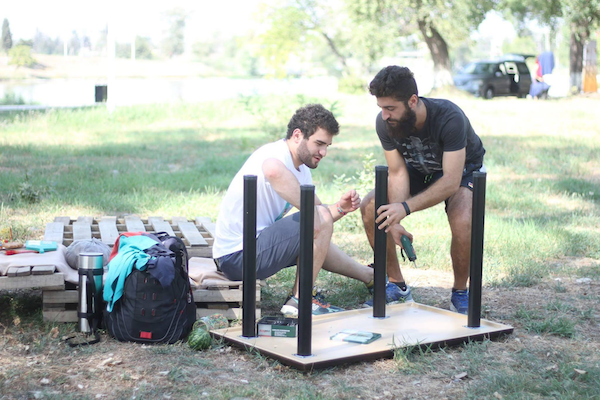Two young men prepare a stand for Social Café Cafune during the SDG festival in Rustavi, Georgia. Photo: UNDP Georgia
When you hear the phrase “networked youth”, you assume it means a generation of young people who have come of age in an era of constant digital connectivity. While true, they also bring skills, network and resources to the physical space.
In the social activism space, “Networked youth” are groups of young people, coordinated mostly through electronic networks, that come together around pressing issues and address them with extraordinary coherence, speed, and efficiency. They tap into their highly developed network for resources and expertise. Most times, however, they are operating on the margins of society without knowing each other, and face risks of eviction from not having permission to use the spaces they are occupy, be it physical or online.
Through our previous work “Spot the Future” and “Make the Future”, we wondered: What if they are given a broad “license to operate” in unused public spaces and can complement social services that municipalities are providing?
Together with UN Volunteers and EdgeRyders, we launched the “FutureMakers” project in 2015 to experiment with new forms of collaboration between public authorities and networked youth in Armenia, Egypt and Georgia.
How we did it
Unlike our traditional approach of giving grants to youth groups, UNDP acted solely as a convener. We focused our efforts on ensuring legitimacy in the use of public space; reaching out to and bringing onboard young people already working to solve development challenges; and facilitating the dialogues among these youth groups and community members on the use of space. We aimed to create a connective layer between active citizens and public space institutions – a dialogue and learning space to serve as fertile ground for branching out and multiplication.
One or two hired community mobilisers in each country reached out and engaged youth through one-on-one meetings, informal meet-ups, talk events and social media. We also brought public institutions, mainly at the municipal level, on board and obtained the general approval to use an unused public space. Throughout the process, we sat back and, to the extent possible, just observed ideas and actions emerging from the networked youth being discussed and prioritized. We primarily counted on the resources and expertise that youth and their network could bring to the table.
Results
After 15 months of trials and errors, inspirations and creativities, we stand to learn from three unique prototypes:
In Armenia, community activists, architects, designers and volunteers have gathered around an abandoned underpass in central Yerevan to discuss how to transform the space. Final ideas will be shared with the municipality to get a greenlight for implementation.
In Egypt, young volunteers developed initiatives to improve the public space surrounding an informal community in Akhmin, Sohag Governorate. Youth presented the ideas (including a community school, rooftop gardening and tourism campaign) and the roadmap to the senior officials of Governorate and received approval to get started.
In Georgia, youth realized their dream to make Rustavi, a former industrial city, more colourful. Having received the permission for an unused space behind the Park, they are transforming it into a social café to host learning activities and community exchanges.
Lessons
Keeping government and community incentives aligned, while maintaining healthy dynamics for long-term cooperation, is hard work. Organizations that have local trust, history and networks, like UNDP or a similar entity, can play an important catalytic role in bringing networked youth and municipality together to make FutureMaker-like initiatives work, especially when:
i) A public space which satisfies the interests of both the networked youth and the municipal office is chosen;
ii) there is a clear support within the municipality who could make this type of new collaboration happen/sustain;
iii) a community mobiliser who is from the community and could tactically reach out to and engage various community members is on board; and
iv) ample time is secured for partnership building both with the municipality and with the communities.
While these three initiatives are followed through at the country office level, we are working on a new concept to nurture “bureaucrat hackers”: civil servants or political appointees who creatively overcome the limitations of public administration systems to achieve novel and smart outcomes.

 Locations
Locations

